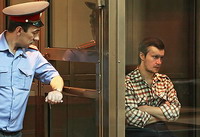Court convicts Alexander Pichushkin of 48 murders
A carpenter by training, a diligent worker to his employers and a regular guy to his neighbors - none knew that Alexander Pichushkin planned to fulfil the goal of one murder for each of the 64 squares on a chessboard.

Pichushkin said killing was as essential to him as eating is to others, and he was just one victim short of his goal when police caught him last year.
However, prosecutors could only find evidence to charge him with 48 slayings and three attempted murders. On Wednesday, a Moscow jury convicted Pichushkin of all counts after just over two hours of deliberations.
Pichushkin leaned against the wall of his reinforced glass cage and stared at the floor as the foreman read the verdict.
About a dozen relatives of the victims also were in the courtroom, including one woman who sat with tears in her eyes after the verdict was read, refusing to speak to reporters.
Moscow Chief Prosecutor Yuri Syomin recommended life in prison, with the first 15 years in isolation. Russia has maintained a moratorium on the capital punishment as part of its obligations to the Council of Europe.
A carpenter by training, Pichushkin, 33, was a diligent worker to his employers and a regular guy to his neighbors, who described him in references as "disciplined and diligent," and "polite and tactful."
But his polite, hardworking demeanor concealed a murderous urge he said he could not control.
"For me, a life without murder is like a life without food for you," Pichushkin earlier confessed.
His first victim was a school friend he strangled in 1992 after he refused to join him in a killing.
But the murderous rampage only began in earnest nine years later on a summer's day in 2001.
"It dawned upon me on that day that I would murder someone," he said during the trial.
Prosecutors said Pichushkin lured his victims - mostly homeless, alcoholic and elderly - to the park by promising them vodka if they would join him in mourning his dog's death. The killings, in Bittsa Park, earned the serial killer the nickname the "Bittsa Maniac."
He killed 11 people in 2001, including six in one month, prosecutors said. Most were thrown into a sewage pit after they were drunk, and a few were strangled or struck on the head, prosecutors said.
Beginning in 2005, he began to kill with "particular cruelty," hitting his intoxicated victims multiple times in the head with a hammer, then sticking an unfinished bottle of vodka into their shattered skulls, prosecutors said. He also no longer tried to conceal the bodies.
Pichushkin drew "particular pleasure and satisfaction" from finishing off his victims as they "pleaded for mercy," Syomin said.
Prosecutors said Pichushkin admitted to one of his last victims in February 2006 to demonstrate that he was still at large following inaccurate reports in Russian newspapers that the Bittsa Maniac had been caught.
He was arrested in June 2006 after a woman left a note at home saying she was going for a walk with him and then was found dead.
Pichushkin said during the trial that he was aware of the note but "I could not stop myself from killing her."
"I killed so I could live myself: You kill someone and immediately feel relieved, your shoulders straighten up and you want to live," he had said.
However, his lawyer, Pavel Ivannikov, said that despite his seemingly unrepentant and defiant behavior, Pichushkin "is afraid and wants to wiggle himself out."
"He wants to convince us that what he was doing was right," Ivannikov said. "He imagined himself to be God. The one who decides who is to live and who is to die."
Pichushkin is to make a final statement Thursday before Judge Vladimir Usov sets a date for sentencing.
Subscribe to Pravda.Ru Telegram channel, Facebook, RSS!




